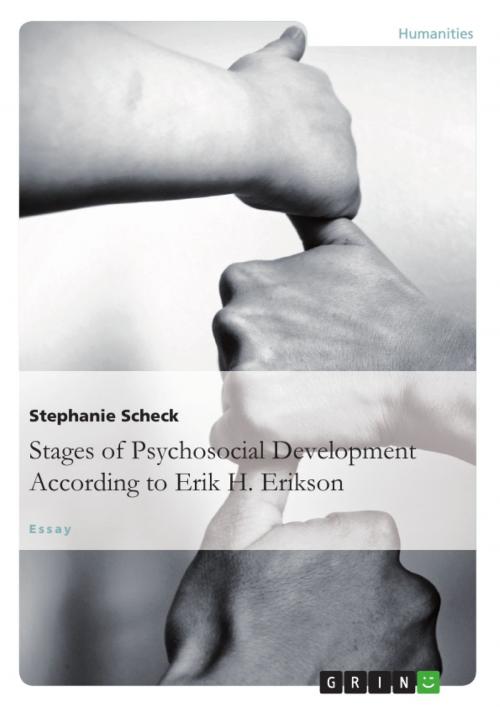The Stages of Psychosocial Development According to Erik H. Erikson
Nonfiction, Health & Well Being, Psychology, Developmental Psychology| Author: | Stephanie Scheck | ISBN: | 9783656837695 |
| Publisher: | GRIN Verlag | Publication: | November 13, 2014 |
| Imprint: | GRIN Verlag | Language: | English |
| Author: | Stephanie Scheck |
| ISBN: | 9783656837695 |
| Publisher: | GRIN Verlag |
| Publication: | November 13, 2014 |
| Imprint: | GRIN Verlag |
| Language: | English |
Scientific Essay from the year 2005 in the subject Psychology - Developmental Psychology, grade: 1,0, University of Kassel, language: English, abstract: Erik H. Erikson (1902 - 1994) is without a doubt one of the most outstanding psychoanalysts of the last century. The native Dane and later US-American further developed the psychosocial aspects and the developmental phases of adulthood in Sigmund Freud's stage theory. It is Erikson's basic assumption that in the course of a lifetime, the human being goes through eight developmental phases, which are laid out in an internal development plan. On each level, it is required to solve the relevant crisis, embodied by the integration of opposite poles presenting the development tasks, the successful handling of which is in turn of importance for the following phases. The term crisis does not have a negative connotation for Erikson, but rather is seen as a state, which through constructive resolution leads to further development, which is being integrated and internalized into the own self-image. 'Each (component) comes to its ascendance, meets its crisis, and finds its lasting solution (...) toward the end of the stages mentioned. All of them exist in the beginning in some form.' Hence, the human development is a process alternating between levels, crises, and the new balance in order to reach increasingly mature stages. In detail, Erikson studied the possibilities of an individual's advancement and the affective powers that allow it to act. This becomes particularly obvious in the eight psychosocial phases, which now should be the focus of this paper. This demonstrates that Erikson did see development as above all: a lifelong process.
Scientific Essay from the year 2005 in the subject Psychology - Developmental Psychology, grade: 1,0, University of Kassel, language: English, abstract: Erik H. Erikson (1902 - 1994) is without a doubt one of the most outstanding psychoanalysts of the last century. The native Dane and later US-American further developed the psychosocial aspects and the developmental phases of adulthood in Sigmund Freud's stage theory. It is Erikson's basic assumption that in the course of a lifetime, the human being goes through eight developmental phases, which are laid out in an internal development plan. On each level, it is required to solve the relevant crisis, embodied by the integration of opposite poles presenting the development tasks, the successful handling of which is in turn of importance for the following phases. The term crisis does not have a negative connotation for Erikson, but rather is seen as a state, which through constructive resolution leads to further development, which is being integrated and internalized into the own self-image. 'Each (component) comes to its ascendance, meets its crisis, and finds its lasting solution (...) toward the end of the stages mentioned. All of them exist in the beginning in some form.' Hence, the human development is a process alternating between levels, crises, and the new balance in order to reach increasingly mature stages. In detail, Erikson studied the possibilities of an individual's advancement and the affective powers that allow it to act. This becomes particularly obvious in the eight psychosocial phases, which now should be the focus of this paper. This demonstrates that Erikson did see development as above all: a lifelong process.















